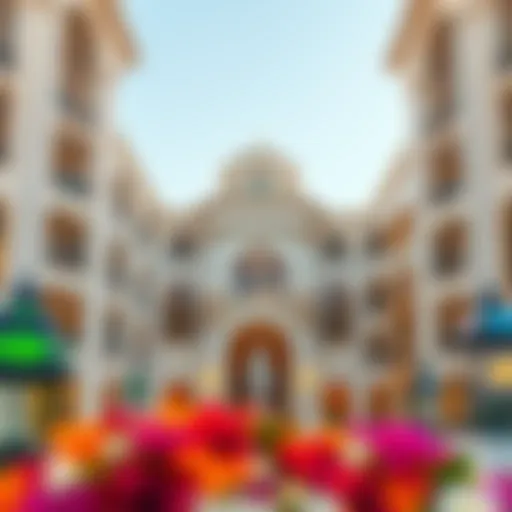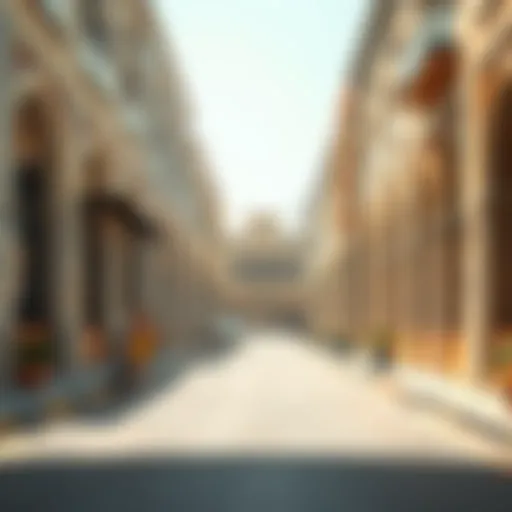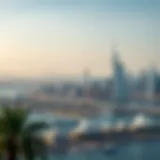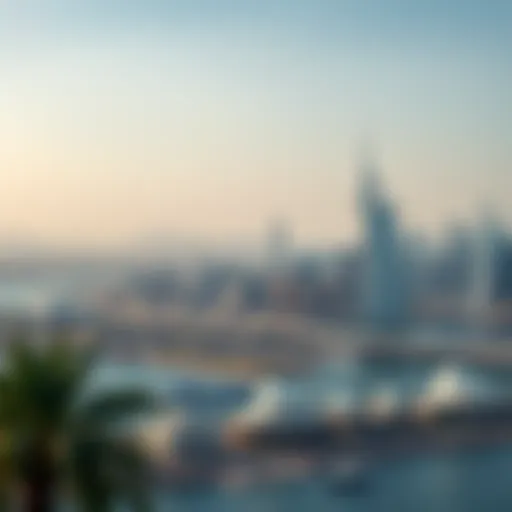Discovering the Gold Souk: A Cultural and Economic Insight


Intro
Nestled in the bustling heart of Dubai lies the Gold Souk, a marketplace that pulses with life and glimmers with the brilliance of gold. This vibrant hub is not merely a shopping destination; it serves as a cultural landmark, a staple of the local economy, and a witness to the evolution of trade practices over decades. Travelers and residents alike gather to explore an extensive array of gold jewelry and other precious metals, all while absorbing the rich history and traditions embedded within this age-old marketplace.
Stepping into the Gold Souk is akin to entering a kaleidoscope of sights and sounds. The intricate designs and the sheer volume of offerings can mesmerize even the most seasoned shopper. For investors eyeing real estate opportunities in the vicinity, understanding the nuances of this marketplace is paramount. The Gold Souk’s influence reaches beyond its immediate locale; it is tightly woven into the economic fabric of Dubai and the broader UAE.
In the sections that follow, we'll dig deeper into the unique dynamics that define this marketplace. From current trends impacting gold trading to historical insights that shape its future, we will unpack an array of information that caters to investors, realtors, home buyers, developers, and analysts alike.
Historical Context of the Gold Souk
The Gold Souk in Dubai stands as a testament to the evolution of commerce in the region. Embedded within the fabric of Dubai's history, the souk not only serves as a marketplace but also reflects the city's transition from a modest trading post to a bustling cosmopolitan hub. Understanding the historical context of the Gold Souk offers insights into how gold trade has shaped economic landscapes while nurturing cultural ties.
Origins of Gold Trade in Dubai
The gold trade in Dubai can trace its roots back several centuries, starting around the mid-19th century. The strategic location of Dubai along the trade routes linking the East and West attracted merchants from various backgrounds. This prominence laid the groundwork for the flourishing gold market.
- Dubai was a natural meeting point due to its proximity to countries rich in gold resources, such as India and Iran.
- Local merchants began trading not just in gold but also in spices, textiles, and other valuable goods, contributing to an early economy based heavily on trade.
- As the demand for gold jewelry grew, especially among the local communities, the trade began to diversify, leading to an increase in specialized shops.
Development of the Souk as a Marketplace
With the increase in gold importation in the early 20th century, the Gold Souk began to take shape. By the 1940s, Dubai's first organized market dedicated to gold and jewelry laid its foundations in the bustling commercial district.
- The souk’s architecture combines traditional Emirati styles with modern influences, enhancing the shopping experience. Gold merchants adorned their stores with elaborate designs, attracting potential buyers with stunning displays.
- Throughout the years, the souk witnessed a transformation from a simple collection of stalls to a complex market consisting of hundreds of retailers.
- The trade regulations introduced in the late 1970s further boosted the growth and authenticity of the souk, ensuring quality while establishing the reputation of gold sold in Dubai as reliable and desirable.
Significant Milestones in its History
The Gold Souk's history is marked by several significant milestones that have influenced not only local culture but also the regional economy.
- Oil Discovery (1966): The discovery of oil transformed Dubai's economy, leading to an influx of wealth. This newfound wealth increased the demand for luxury goods, including gold.
- The Gold Souk Expansion (1980s): To accommodate the growing influx of tourists and expatriates, the souk underwent significant development, resulting in larger storefronts and more diverse offerings.
- International Recognition (2000s): With global tourism on the rise, the Gold Souk quickly became one of Dubai's main attractions, drawing visitors who sought both investment opportunities and traditional craftsmanship.
"The Gold Souk is more than a marketplace; it's a cultural landmark reflecting the essence of Dubai's evolution."
As the souk continues to thrive, understanding its historical context becomes crucial for any investor or visitor hoping to navigate the complex world of gold trading in Dubai. The journey of the Gold Souk from a modest trading hub to an international commodity leader illustrates how cultural heritage and economic forces interweave, creating a rich tapestry of commerce that has stood the test of time.
Cultural Significance
The Gold Souk in Dubai is not merely a marketplace; it stands as a testament to the cultural and economic fabric of the Emirati community. The interplay of tradition, festivity, and community life is vividly demonstrated within the souk's bustling lanes. With every shimmering piece of gold, there are stories to be told and connections to be made that echo the cultural identity of the UAE.
Symbolism of Gold in Emirati Culture
Gold is more than just a precious metal in Emirati culture; it embodies wealth, prosperity, and heritage. The allure of gold resonates deeply, signifying not only material wealth but also the richness of Emirati traditions. In the eyes of many Emiratis, possessing gold is akin to holding on to a legacy that transcends generations. Moreover, gold often represents stability amidst the tumultuous waves of economic change.
Consider the intricate designs of traditional Arabic jewelry found in the souk. Each piece often tells a story that connects the wearer to their ancestry. For example, a local woman might wear a traditional "khaat" necklace during important family gatherings, symbolizing both grace and resilience. This deep-rooted association between gold and identity bursts brightly in the wake of cultural celebrations and personal milestones.
The Role of Gold in Traditional Celebrations
Gold plays a pivotal role in various traditional celebrations across the UAE. Take weddings, for instance; they are grand affairs and gold is central to the festivities. Families often invest considerably in gold jewelry for brides, which becomes a symbol of status and familial pride. Craftsmen in the souk are well-versed in creating bespoke pieces that blend modern design with classic touches, allowing for personalization of each piece.
Additionally, during Eid celebrations, gifting gold is a common practice. It symbolizes generosity and good fortune, reinforcing bonds among family members and friends. This ritual fulfillment solidifies the place of gold in social customs, making it a vital part of the region's celebratory culture.
Community Engagement and Events at the Souk


The Gold Souk serves as a community hub, hosting various events that foster engagement among locals and tourists alike. Regular markets and cultural festivals are organized within the souk, where artisans display exquisite craftsmanship. Visitors often encounter live demonstrations of traditional goldsmithing, enhancing their understanding of both the artistry and history behind every piece.
Moreover, events like the Dubai Shopping Festival grease the economic wheels, offering discounts and promotions that encourage both residents and visitors to partake in the vibrant atmosphere of the souk. Such occasions not only bolster commerce but also encourage community solidarity, inviting individuals from diverse backgrounds to celebrate together.
"The Gold Souk is more than a place to shop; it's where culture breathes, and history shines in every golden thread."
Overall, the cultural significance of the Gold Souk is manifested in its role as a bridge between tradition and modernity. Whether it is through the deep symbolism of gold in local customs or the community-centered approaches seen in traditional events, the souk offers profound insights into Emirati identity, making it a cornerstone of Dubai's cultural landscape.
Economic Impact of the Gold Souk
The Gold Souk in Dubai stands as a pillar not only of cultural heritage but also as a significant contributor to the economic tapestry of the region. Its reputation for being one of the largest and most vibrant gold markets in the world makes it a key player in various sectors, including jewelry manufacturing, tourism, and real estate. With its undeniable allure, the souk draws millions of visitors each year, thereby stimulating economic activities that ripple throughout Dubai and beyond.
Contribution to Dubai's Economy
The Gold Souk is much more than a market; it's a crucial cog in the wheel of Dubai’s economic engine. The flow of trade and commerce here has far-reaching implications. In 2022 alone, gold trading in Dubai was valued at approximately more than 70 billion AED, underlining the souk's pivotal role.
The souk supports numerous local businesses, from small family-owned jewelry shops to high-end retailers. This diversity means a broad spectrum of job opportunities are available, employing not just jewelers and goldsmiths but also salespeople, tour guides, and logistics personnel. Moreover, the indirect benefits to the surrounding commercial sectors, including hospitality and transport, can't be overstated. Visitors who flock to the Gold Souk often find themselves exploring nearby cafes and hotels, further enriching the local economy.
"A vibrant marketplace like the Gold Souk doesn't just create wealth; it fosters a community spirit where commerce encourages connections."
Additionally, the Dubai government recognizes the souk’s importance as a major tourist attraction. Consequently, initiatives aimed at promoting the souk have resulted in more substantial investment in infrastructure and amenities. This not only enhances the shopping experience but also reinforces Dubai's international reputation as a premier shopping destination.
Investment Opportunities Surrounding the Souk
The Gold Souk presents a variety of investment opportunities that savvy investors and realtors can capitalize on. The demand for gold and jewelry forms a steady stream of revenue, and potential growth is evident in new ventures aimed at capturing the luxury market segment.
In recent years, there has been a noticeable shift towards upscale retail experiences that blend traditional craftsmanship with modern aesthetics. This opens doors for investors looking to develop high-end boutiques that can cater to affluent buyers, particularly as tourism rebounds post-pandemic.
Furthermore, the area's real estate market has shown resilience and growth potential. Properties close to the Gold Souk command a premium, fueled by the surge in tourism and consumer spending. Many investors see value in commercial real estate ventures, such as hotels and office spaces that can cater to both tourists and local entrepreneurs.
Influence on Jewelry Trade in the Region
The Gold Souk is more than just a retail hub—it's a trendsetter in the jewelry industry across the Middle East. Many local jewelers not only serve as retailers but as manufacturers, creating intricate designs that are often imitated throughout the region. The exposure to diverse styles, gemstones, and tribal designs has established Dubai as a leading jewelry design center, influencing aesthetic sensibilities beyond its borders.
Local artisans often participate in international fairs and exhibitions, showcasing their unique designs and craftsmanship, which further solidifies Dubai’s reputation. This influence can be seen in burgeoning markets across the Gulf states, where Dubai sets the standard for quality and variety in gold and jewelry products.
With the ongoing transformation in consumer preferences—especially towards ethically-sourced materials—jewelers in the Gold Souk are adapting quickly. This shift not only responds to market demands but also paves the way for sustainable practices within the industry, which can foster both growth and responsibility.
The enduring popularity and economic relevance of the Gold Souk highlight its multifaceted impact. It's clear that this marketplace isn’t just about gold; it symbolizes the intricate dance of commerce, culture, and community prosperity.
Navigating the Gold Souk
Navigating the Gold Souk can feel like stepping into a vibrant tapestry, woven from memories of trade and celebration. This part of the article is essential as it offers crucial insights into the heartbeat of this beloved marketplace. Visitors and locals alike experience the lively atmosphere that thrives on the delicate exchanges of shimmering gold and the art of negotiation. The souk is not just a place to shop; it's a mosaic of cultures, traditions, and human interaction.
Key Players in the Marketplace
Understanding who holds sway in the Gold Souk is vital for any shopper aiming to make informed purchases. The marketplace comprises various players, including:
- Local Jewelers: Many brands, like Damas and Malabar Gold, dominate the landscape with stores boasting exquisite collections. These jewelers often have deep roots in the Dubai community, lending authenticity and trust to their offerings.
- Artisans and Goldsmiths: Behind the glitzy display cases, artisans practice their craft, intricately designing custom pieces. Their skills often surpass mere commerce; they preserve a cultural heritage that has been passed down for generations.
- Buyers: Shoppers range from tourists enchanted by the prospect of glittering souvenirs to serious investors looking for valuable returns.
Each player plays a critical role, forming an ecosystem that sustains the souk’s vibrant culture of commerce.
Understanding Pricing and Quality of Gold


Gold prices in the souk are influenced by several factors, and understanding these is key to making a savvy purchase. Firstly, the price is pegged closely to global market rates, fluctuating based on daily trading. This means that a keen awareness of daily gold rates is indispensable for both buyers and investors.
Quality plays an even more critical role. The karat system, which measures purity, is central to understanding value. Common purities include:
- 24K: Pure gold, soft and malleable, most sought after by purists.
- 22K: Slightly less pure but more durable; it’s a favorite for traditional jewelry.
- 18K: Offers a balance of durability and beauty; popular among modern designs.
As a buyer, it’s advisable to ask for certification and, if possible, examine hallmarks that verify purity. Knowing these details can save one from common pitfalls.
Tips for First-Time Buyers
For those new to the Gold Souk, here are some strategies to make the most of your experience:
- Do Your Homework: Familiarize yourself with current gold prices and quality before you even step foot into the souk. There’s much value in being prepared.
- Bargaining is Expected: Here, art of negotiation is as important as the products. Don’t shy away from haggling, as it’s part of the culture. Starting below the asking price can often lead to favorable outcomes.
- Examine and Compare: Take your time moving from store to store. Every shop has its unique offerings, and prices can vary significantly.
- Check for Authenticity: Always ask for proper documentation—receipts, authenticity certificates, and return policies. This not only protects your investment but provides peace of mind.
"Navigating through the delicate strings of trade in the Gold Souk can feel overwhelming, but with a keen eye and a bit of preparation, you can find treasures worth their weight in gold."
Each of these tips serves to not just ease one’s journey through the souk, but also enhances the strategic approach to purchasing gold that could appreciate over time. The Gold Souk is not merely about buying gold; it's about embarking on a cultural journey steeped in history and commerce.
Emergence of Digital Gold Trading
The shift towards digital gold trading marks a significant evolution in the way consumers and investors engage with the gold market. As online platforms make purchasing gold more accessible, this trend holds the potential to reshape traditional practices of buying gold, offering both conveniences and challenges that need careful consideration.
Rise of Online Platforms for Gold Buying
More and more, people are turning to online platforms to purchase gold. This is not just a passing fad. Companies like BullionVault and GoldSilver provide opportunities to buy, sell, and store gold without stepping into a physical shop. These digital platforms are benefitting from ease of use, meaning that buyers from all corners of the world can invest in gold at the click of a button. It allows for comparing prices across various vendors in real-time.
- Accessibility: The ability to buy gold from the comfort of one's home is enticing. No longer do individuals have to travel to crowded souks, which can often be an overwhelming experience.
- Real-time Transactions: Online platforms tend to offer instantaneous transactions, which can be faster than traditional methods, where negotiating prices can often delay purchases.
- Reduced Overheads: Digital platforms often operate with lesser physical overhead costs, allowing them to offer lower prices on gold.
Challenges Facing Traditional Gold Markets
Despite the rise in digital gold trading, traditional gold markets, such as the Gold Souk, are not without their challenges.
- Competitive Pricing: The allure of online markets often comes from competitive pricing. Traditional vendors may find it difficult to keep up amidst decreasing customer footfall.
- Consumer Trust: Digital platforms require buyers to trust a system that they may not fully understand. This trust may not yet be present for many when it comes to purchasing something as precious as gold.
- Economic Shifts: As the digital landscape grows, there is the underlying fear that traditional markets may diminish, leading to a loss of cultural heritage and community engagement exemplified by the Gold Souk.
Future Trends in Gold Trading
The future of gold trading is poised for unforeseen advancements, wherein the integration of technology will continue to rise.
- Blockchain Technology: One promising development includes the use of blockchain for tracking gold's provenance. This can ensure transparency in sourcing— a major concern for ethically conscious shoppers.
- Fractional Gold Investments: Digital platforms are also enabling fractional ownership of gold, allowing investors to buy shares of physical gold rather than entire pieces. This opens doors for small and medium investors to participate in the gold market.
- Augmented Reality (AR): Future platforms might incorporate AR to provide an immersive shopping experience, allowing buyers to visualize how a piece would look before purchase.
"The intersection of gold and technology signals a revolutionary turning point for investors, offering new avenues for engagement and investment in a timeless asset."
Environmental and Ethical Considerations
The gold industry is often seen through a lens of glitz and glamour, but there’s a gritty reality lurking beneath the surface. As Dubai’s Gold Souk continues to be a cornerstone of regional commerce, it’s crucial to shine a spotlight on the environmental and ethical considerations that come with gold trading. Understanding these elements isn't just about playing fair; it’s about ensuring that the future of gold remains sustainable and responsible.
Sustainable Practices in Gold Mining
When we talk about sustainability in gold mining, it’s about how to keep the earth happy while extracting this precious metal. Traditional mining methods can lead to devastating environmental impacts. For instance, the use of mercury and cyanide in extraction processes not only pollutes the water but also harms local ecosystems and communities. However, innovative, sustainable practices are emerging.
In some regions, miners are adopting artisanal methods that are less invasive. For example, they utilize hand tools instead of heavy machinery which minimizes land disruption. Recycling gold from old jewelry and electronics is also gaining traction as a means to conserve resources, reduce pollution, and lower overall energy consumption.
Ethical Concerns in Gold Sourcing


Ethics in gold sourcing cannot be overlooked. The term “blood gold” is often used, reflecting the grim realities associated with some mining operations where conflict, human rights abuses, and exploitative labor practices thrive. Without robust traceability systems, it becomes nearly impossible to ensure that the gold being sold wasn't produced under dire conditions.
A growing number of consumers are becoming aware of these issues and are seeking assurance that the gold they purchase is sourced responsibly. Initiatives like the Responsible Jewelry Council (RJC) aim to set ethical guidelines and ensure that members adhere to sustainable business practices. Transparency is becoming the name of the game.
Regulatory Frameworks Governing Gold Trade
Regulatory measures play a vital role in shaping the ethical landscape of gold trade. Various governments and organizations have laid down frameworks aimed at promoting sustainable and ethical practices in mining and trading. For instance, the OECD Due Diligence Guidance for Responsible Supply Chains gives companies a roadmap for identifying risks that are associated with sourcing gold.
These regulations not only promote ethical practices but also enforce penalties for those who fail to comply. Countries like the United States have implemented the Dodd-Frank Act, which requires companies to disclose whether their gold comes from conflict-affected areas. This kind of legislation is crucial in pushing the industry towards greater accountability.
"As consumers become more conscious, businesses need to reflect their values through ethical sourcing. Trust is the new currency in gold trade."
In summary, while the gleaming allure of gold might be enticing, the path it takes from mine to market is riddled with challenges that need to be addressed. Investors, realtors, or anyone interested in the economic aspects of the Gold Souk should consider these environmental and ethical factors as they navigate this complex landscape. The future of gold isn't solely about profit; it’s about ensuring that the industry thrives responsibly and sustainably.
Personal Stories: Testimonials from Shoppers
Exploring the Gold Souk isn't just about the shimmering jewelry; it's a journey into human experiences that echo the wider cultural and economic significances of this vibrant marketplace. Personal stories allow us to peel back the layers and see how the souk influences lives, intertwining commercial transactions with emotional narratives. These testimonials showcase the warmth of the local culture, shedding light on what makes the Gold Souk a unique nexus of community and commerce.
Experiences of Local Patrons
When you step into the Gold Souk, it's not just gold that captivates; it's the stories behind each purchase. Local patrons often recount their experiences with a sense of nostalgia. One such story comes from Aisha, a long-time resident of Dubai. She recalls visiting the souk with her mother as a child, their arms linked as they wandered through the bustling alleyways. "Buying gold was a family affair," Aisha says, "We’d select pieces not just for their beauty, but for the memories they carried."
This sentiment is echoed throughout the marketplace. Patrons share how the personal connection with shop owners creates a familial ambiance. The easy banter, the shared laughter, and even haggling—these elements forge bonds that lead to lifelong customer loyalty. For many, a visit isn’t just about buying; it’s about revisiting a cherished memory or creating a new one.
"Every piece of gold has a story, and sometimes, those stories are as precious as the jewelry itself."
These local experiences relayed by patrons highlight the sentimental value of purchasing gold, intertwining individual stories within the broader tapestry of Dubai’s cultural heritage.
Impacts of Gold Purchases on Lives
Gold purchases often represent significant milestones in one's life, carrying deep personal and societal implications. Many locals reflect on how buying gold goes beyond merely acquiring a material possession; it often marks moments of transformation. For instance, purchasing gold jewelry is commonly linked with engagements, weddings, and births, serving as a tangible representation of one’s commitment and aspirations.
Consider the story of Omar, who invested in a gold ring for his daughter's engagement. The choice wasn’t just about the ring; it was an embodiment of his pride and love as a father. "When I handed her that ring, it symbolized my blessings and hopes for her happiness," Omar recounts.
The impact stretches even further. Gold means wealth preservation for many families. In turbulent times or financial crises, selling or pawning gold can provide a lifeline. Local testimonies reveal that families often rely on the value of their gold—purchases made years ago that serve as a savior in difficult moments. This multifaceted role of gold, as both a luxury and a secure asset, enriches the narrative around the Gold Souk, helping ordinary lives navigate the unexpected twists and turns of life.
In the end, personal stories from shoppers at the Gold Souk don’t just layer richness onto the marketplace; they illuminate its role as a cultural cornerstone in Dubai. They encapsulate the melding of tradition, emotion, and economics, showcasing how this souk serves not only as a jewelery hub but also as a space where lives are changed and memories forged.
Finale: The Future of Gold Souk
The Gold Souk in Dubai is more than just a marketplace; it is a thriving ecosystem that mirrors the economic and cultural evolution of the city itself. Understanding the future of this iconic souk is critical, not only for investors and traders who seek to tap into its potential but also for those who value cultural heritage.
Continuing Legacy of the Souk
As Dubai positions itself as a global trade hub, the Gold Souk continues to stand as a testament to its historical significance and entrepreneurial spirit. This bustling market has adapted over the years, embracing modern marketing techniques without losing its traditional charm.
- Cultural Preservation: The souk's architectural style and layout evoke strong images of its past. Shops are often family-owned, passing down the art of craftsmanship from one generation to another.
- Tourism Magnet: The souk is a must-visit destination for tourists, which in turn supports local artisans and shop owners. Encouraging sustainable tourism is essential for its ongoing relevance.
- Innovation in Design: Goldsmiths and jewelers are evolving their offerings, introducing more contemporary designs that appeal to younger demographics.
The ongoing legacy of the Gold Souk is a blend of old and new, a match of traditional values with modern business practices. It is this duality that ensures its survival amid changing times.
Final Thoughts on Its Economic and Cultural Roles
Moving forward, the Gold Souk will likely play a vital role in shaping both the economy and cultural agenda of Dubai.
- Economic Resilience: The economic significance of the souk cannot be overstated. As gold investments continue to attract interest from various stakeholders, the souk remains at the center of this activity. The presence of a robust regulatory framework supporting fair trade will bolster consumer confidence and further stimulate economic growth.
- Cultural Identity: The souk serves as a cultural beacon, reflecting the values and traditions of Emirati society. As the city embraces a multicultural future, the Gold Souk remains a symbol of unity, showcasing how diverse influences can harmoniously coexist.
"The enduring nature of the Gold Souk lies not just in the yellow metal but also in the spirit of community, tradition, and sustainability."
In essence, as we look to the future, the Gold Souk’s ability to balance modernization with heritage will dictate its relevance in the marketplace. It stands not just as a shopping destination but as an emblem of culture, connection, and economic vitality, poised to adapt and thrive in an ever-changing world.















